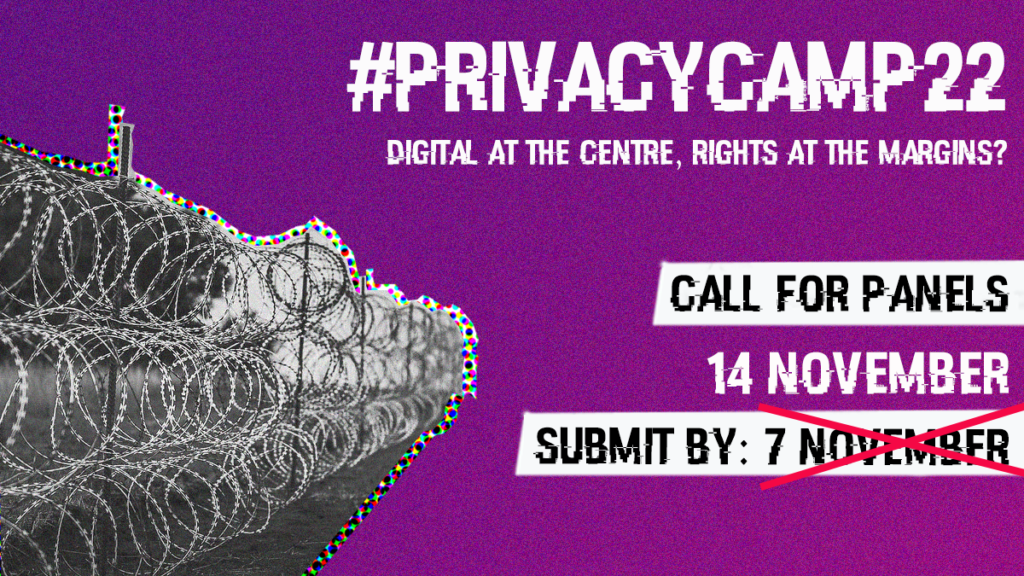** UPDATE: The deadline is extended to 14 November 2021, 23:59 CEST.
Privacy Camp turns 10. It is time to celebrate. But Privacy Camp 2022 is also the occasion to reflect on a decade of digital activism, and to think together about the best ways to advance human rights in the digital age.

The 10th edition of Privacy Camp invites for a forward-looking retrospective on the last decade of digital rights. This edition aims at building on the lessons of the past and at collectively articulating strategic ways forward for the advancement of human rights in the digital society.
Emerging intersections within the realms of regulating digitalisation as well as within other broader social justice movements point that – while some issues remain timeless – the power struggles ahead might happen on new terrain(s).
How can we adapt to these new terrains, while drawing on a decade’s worth of lessons? How can we organise with broader groups of people and other communities? What are the points of reflection we must focus on, to address the wider impact of the digital rights’ fight?
Concretely, we want to explore ideas for (1) putting rights at the centre of digital policies, and (2) bringing marginalised perspectives to the core of digital rights discussions. In this spirit, we call for solution-oriented panel proposals around the following themes:
1. Putting rights at the centre of digital policies
Too often, rights are an after-thought of digital policies. In the past decade we have seen again and again decision-makers decide first, and think about the impact on digital rights later. How can this be changed, to have future policy decisions getting rights right from the start, notably in relation to automated decision-making, the platform economy, data protection and privacy of communications, and the surveillance infrastructure?
Notably, we invite proposals tackling questions such as the below:
- What can we learn from national and EU debates around digital rights, that will be relevant for current and upcoming challenges?
- At EU level, has there been an evolution in terms of better integration of fundamental rights concerns into policy-making and socio-technical design?
- Has the changing role of EU institutions in relation to fundamental rights affected their approach to digital policy? Does it depend on the EU institution?
- Halfway through its term, how is the European Commission standing in terms of digital rights and policies?
- How do debates about EU digital policies intersect with the power of Big Tech and national states?
- How to make sure that rights remain a central priority when legal instruments have been adopted and what is needed is to guarantee their effective enforcement (e.g. GDPR enforcement)?
2. Bringing marginalised perspectives at the core of digital rights discussions
The digital rights agenda was never neutral. It has been shaped over the years by a predominantly reactive approach to digital policy debates. Importantly, it also has its own dynamics dependent on a rather specific set of priorities. This means that some perspectives on digital rights, notably those coming from the point of view of marginalised people and communities, have been themselves marginalised. What are the voices and issues that have been left out, heard less, or simply not amplified enough?
Notably, we invite proposals tackling questions such as the below:
- How have digital rights strategies and approaches suffered from a limited perspective in the past?
- How can the digital rights community better centre the voices of people disproportionately affected by exploitative digitalisation, such as women, LGBTQI+ communities, racialised communities and people from the global south, people with disabilities, working-class people?
- What are the lessons learnt from creating broader coalitions with other actors such as workers’ unions, groups advocating for women rights, LGBTQI+ rights, anti-racism movements, or migrants’ rights defenders?
- What can we learn from how marginalised groups have been affected by digitalisation, and what effects have legal frameworks had to counter this disproportionate impact?
- How can we make sure that when we put rights at the centre of digital policies the concerns of marginalised people are given the necessary space?
- How might the digital rights field incorporate transformative justice and decolonial perspectives into its work?
Deadline for panel proposal submissions: 7 November 2021
Background
The past decade brought the increased digitalisation of all aspects of our life. This process has led to a growing production of data in digital formats, be they personal or non-personal data, data related to content or metadata, and often sensitive data because of their nature or because of how they are processed.
In this context, corporate and government entities have gained unprecedented power. Internet services and digital technologies have developed in often inadequate and insufficient regulatory frameworks. As a result, many have been excluded from the benefits of the digitalisation process.
In the realm of the internet, but also beyond it, our societies have seen the rise and normalisation of government mass surveillance and surveillance capitalism, with Big Tech power grabbing from all areas of public life including public services. Connected to this trend, public and political debates have often been centred around securitisation arguments, and policy-making focused on counter-terrorism measures, and border and migration surveillance.
Against this tide, civil society, along with academia and some policymakers have worked together to curtail the harms of data exploitation and promote regulatory frameworks that put human rights at their centre.
In the past 10 years, Privacy Camp has become a forum that facilitates discussion and debates, and that offers occasion to coordinate and strategize better. It has foregrounded issues concerning EU data protection law, online content regulation and platforms’ power, the confidentiality of communications and the regulation of emerging technologies such as Artificial Intelligence (AI), among others.
In 2020 and 2021, the public debate has been dominated by the impact of harmful online content, the rise of biometrics mass surveillance and, once again, the fake dichotomy between rights and security. Furthermore, the COVID-19 pandemic highlighted our society’s dependence on digital technologies and on the actors that control them, as well as the role of individuals in facilitating or preventing access to data. It thus pushed legislators to focus on the need to further regulate digitalisation, and even re-ignited their aspirations to achieve a so-called ‘digital sovereignty’, of unclear contours.
The digital rights field composition, organisational practices and methods, however, have often left the people most affected by harmful uses of technologies outside of policy, advocacy or litigation work. This has resulted in siloed approaches to human rights in the digital age, or to overlooking the impact of digital infrastructure on marginalised groups and the planet itself.
With this edition of the Privacy Camp, we want to move beyond empty calls to put ‘the (undefined) human at the centre’ into a genuine taking into account of digital rights.
Submission guidelines:
- Indicate a clear objective for your session, i.e. what would be a good outcome for you?
- Include a list of a maximum of 4 speakers that could participate in your panel. Ensure you cover academia, civil society and decision–makers’ perspectives. Let us know which speaker(s) has/have already confirmed participation, at least in principle.
- Make it as interactive as possible and encourage audience participation.
- Support diversity of voices among panelists and strive for multiple perspectives.
- Note that the average panel length is 50 minutes.
To submit a proposal, fill in this form by 14 November 2021, 23:59 CEST.
After the deadline, we will review your submissions and will notify you about the outcome of the selection procedure before 29 November. Please note that we might suggest merging panel proposals if they are similar or complement each other.
About Privacy Camp
Privacy Camp is jointly organised by European Digital Rights (EDRi), Research Group on Law, Science, Technology & Society (LSTS) at Vrije Universiteit Brussel (VUB), the Institute for European Studies at Université Saint-Louis – Bruxelles (IEE at USL-B), and Privacy Salon.
In 2022, Privacy Camp’s Content Committee are: Andreea Belu (EDRi), Gloria González Fuster (LSTS, VUB) and Rocco Bellanova (IEE, USL-B)
Privacy Camp 2022 will take place on 25 January 2022 online.
Participation is free and registrations will open in December 2021.
For inquiries, please contact Andreea Belu at andreea.belu(at)edri(dot)org.
